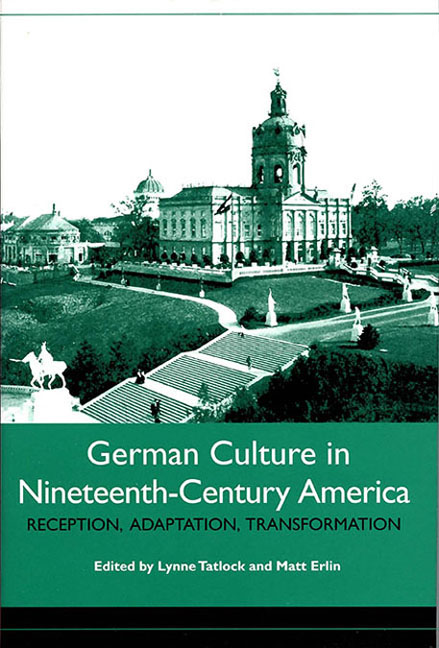Book contents
- Frontmatter
- Contents
- List of Illustrations
- Acknowledgments
- Introduction
- 1 Cultural Politics at the Turn of the Twentieth Century
- 2 In Pursuit of Intellectual Culture
- 3 Translation American Style
- 4 Immigration and Naturalization Acts
- New Country, Old Secrets: Heinrich Börnstein's Die Geheimnisse von St. Louis (1851)
- The Americanization of Franz Lieber and the Encyclopedia Americana
- From Domestic Farce to Abolitionist Satire: Reinhold Solger's Reframing of the Union (1860)
- Contributors
- Index
New Country, Old Secrets: Heinrich Börnstein's Die Geheimnisse von St. Louis (1851)
from 4 - Immigration and Naturalization Acts
Published online by Cambridge University Press: 13 April 2017
- Frontmatter
- Contents
- List of Illustrations
- Acknowledgments
- Introduction
- 1 Cultural Politics at the Turn of the Twentieth Century
- 2 In Pursuit of Intellectual Culture
- 3 Translation American Style
- 4 Immigration and Naturalization Acts
- New Country, Old Secrets: Heinrich Börnstein's Die Geheimnisse von St. Louis (1851)
- The Americanization of Franz Lieber and the Encyclopedia Americana
- From Domestic Farce to Abolitionist Satire: Reinhold Solger's Reframing of the Union (1860)
- Contributors
- Index
Summary
Heinrich Börnstein's novelDie Geheimnisse von St. Louis (The Mysteries of St. Louis) begins in an atmosphere of secrecy and foreboding: “Rauh und wild heulte der Wind durch die schwarze Nacht, die die Strassen von St. Louis in unheimliches Dunkel hüllte . . .” (The wind howled raw and wildly through the black night, which blanketed the streets of St. Louis in an eerie darkness). With this first sentence, the multitalented German-American writer and erstwhile radical, who was also a politician, newspaper publisher, physician, stage actor, and theater director, pulls the reader into the action of his novel about mid-nineteenth-century St. Louis, where he lived from 1849 to 1866. Born in Hamburg in 1805, Börnstein returned with his family to his father's native Lemberg in Austrian-ruled Galicia in the family's effort to escape the Napoleonic Wars. In the 1840s, Börnstein moved from Galicia via Vienna to Paris, and shortly thereafter via New Orleans to St. Louis.
The events that affect the lives of the novel's protagonists, the German immigrant Böttcher family, frequently parallel those described in Börnstein's own autobiographical sketch, which was published several decades after Börnstein returned to Europe in 1866 and excerpts of which have been translated by Steven Rowan as Memoirs of a Nobody: The Missouri Years of an Austrian Radical (1849–1866). Börnstein had been involved in the German and French revolutionary movements of the 1840s, and like many of the failed forty-eighters, he had left the continent to begin a new life in Missouri. Even today, the amalgamation of fact and fiction, of novel and memoir, makes for engaging reading.
Like the novel's creator, the Böttcher family arrives in St. Louis filled with a lively curiosity about the New World, a relaxed, almost pantheistic religiosity that eschews rigid ritualism of any kind, a great admiration for the American ability to deal with adversity and turn misfortune into potential gain, and last but not least, an energetic desire to make a go of it in St. Louis, then a thriving river town. On their way to achieving their goal of living a modest but contented and happy life in Missouri, however, the Böttchers will face many obstacles.
- Type
- Chapter
- Information
- German Culture in Nineteenth-Century AmericaReception, Adaptation, Transformation, pp. 249 - 272Publisher: Boydell & BrewerPrint publication year: 2005



